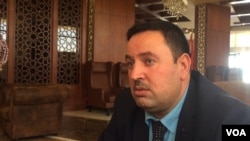Sheikh Yayha Ismail, a Sunni tribal leader from Iraq’s western Anbar province, received me, surrounded by relatives in a modest house in Irbil. Tiny cups with drops of bitter coffee were served, a Bedouin ritual.
Draped in black and gold over starched white robes, he poked the air with his finger.
“Why should we fight Daesh now, for whom? For Iran?” demanded Ismail. “Or should we fight for the safety of America and Europe? We will be silent, we won’t move, we won’t do anything. Let Iran fight for its own benefit, and America fight for its own safety, and after that we will crush everybody under our shoes.”
The Sunnis had been instrumental in combating al-Qaida some years earlier, yet they have not been involved in the fight against Daesh, the derogatory Arabic name for Islamic State, which holds strong in Sunni areas such as Mosul, Fallujah and Ramadi.
The invitation to meet Ismail and other sheikhs came after weeks of emails and an hours-long meeting with tribal representatives testing out my knowledge of Iraq’s history and tribal structures.
I had passed the test, and now I was to listen. In all, I listened for almost 14 hours.
Ismail alternated between acknowledging that the tribes do not have the weapons to hold off the IS militants and recalling, correctly and with fierce pride, that Sunnis number more than a billion in the world.
“We will take revenge for every drop of blood,” he said finally.
The interview ended with a series of slightly awkward, family-photo, album-style photographs.
Sheikh Imad Khalil
Dressed in a dark blue suit, Sheikh Imad Khalil had agreed to meet me in the lobby of a squat, rather bland hotel opposite a vacant lot in Irbil.
Across the lobby floor, several of his attendants sat in faded brown leather couches, alternately listening to our conversation and checking their phones.
Khalil is a member of one of Iraq’s largest Arab tribes, the al Jabouri, whose members lived across central and northern Iraq until Islamic State militants took over their land. He had pulled out a scrap of note paper and was leaning in, his finger tracing the lines of a crude map he had drawn of Sunni escape routes in northern Iraq.
“When people want to escape, this route is blocked by the governor of Kirkuk, so they have to go through the mountains, or through the desert, where they die of thirst," he said. "Thirty families died here as they were running from Daesh.”
Islamic State has overrun large swaths of Sunni areas in Iraq. Those who do not submit to the group’s extreme doctrines are killed, Khalil said.
“My teacher had his head cut off because he criticized their behavior against civilians,” Khalil said. “People are hiding to escape. When Daesh catch those trying to escape, they kill them.”
Sunni escape routes
The al Jabouri have fought hard and suffered large losses against the IS extremists.
Khalil said Sunnis like him are trapped between the extremists and the deep sectarian and ethnic divisions that have fractured the country.
On the one side are the mainly Sunni Islamic State militants who kill anyone who does not agree with their brutal and extremist rule. On the other side are Iranian-backed Shi’ite militias whom Khalil said believe the only good Sunnis are dead Sunnis.
Even though the Kurds have opened their doors to more than a million displaced Sunnis, Khalil and some aid officials said that when it comes to the disputed city of Kirkuk, some Kurds have pushed Sunnis back to avoid tipping the city's demographics.
The lines on Khalil’s paper showed the long, circuitous path he said Sunnis were taking to try to enter the capital of the northern oil-rich province.
The Sunnis, said Khalil, have nowhere to run.
“America must provide the solution,” Khalil concluded. “When they came into Iraq and removed Saddam Hussein, they should have solved things at that time.”
He called on Washington to convoke a conference of all Sunni tribal leaders, listen to their solutions — such as creating an autonomous Sunni region — and present those points to the international community.
But Khalil’s suggestion ignored the fact that there is little unity among Iraq’s tribes.
Just days earlier, a meeting of tribal leaders from Anbar province had turned into a chair-throwing brawl.
Abdel Razzaq Mijbil al Waggaa
The evening was reserved for Major General Abdel Razzaq Mijbil al Waggaa, an older Sunni sheikh who served in Saddam’s army before the United States disbanded it in 2003.
Dressed in traditional white and gold robes, Razzaq asked to speak in private. Once alone, he looked down at the papers he had prepared, and went on to catalog the history of mistakes he said Washington had made since its invasion of Iraq in 2003.
The tribal leaders argue that after they rose up and defeated al-Qaida in Iraq, they were summarily abandoned by the United States, which pulled out of Iraq, and were persecuted by successive sectarian Iraqi Shi’ite governments backed by Iran.
Then he pointed out the Sunni weaknesses: “Our biggest problem is we don’t have real political and religious leaders. Sunni political leaders were corrupted, and they corrupted many sheikhs with money.”
But all that is in the past. The future depends on one thing, he said.
“What does America want?”








